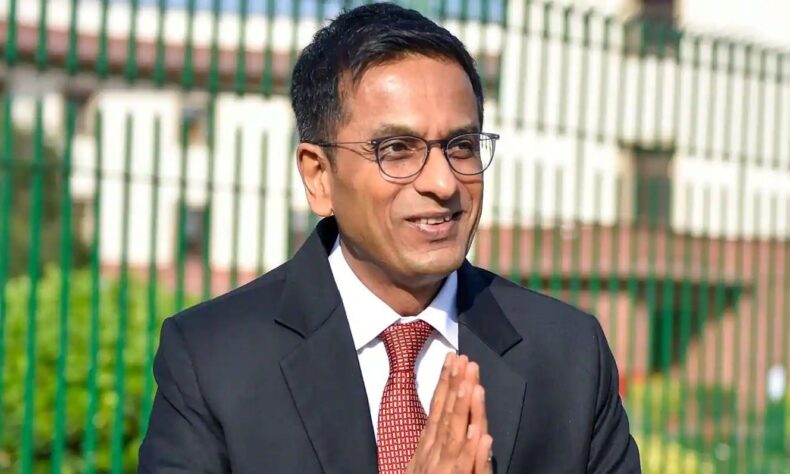On November 9, Wednesday, Justice D Y Chandrachud swore in his oath as the 50th Chief Justice of India.

Dhananjaya Y Chandrachud, the newly appointed Chief Justice of the Supreme Court, paid respects to the Mahatma Gandhi statue at the Supreme Court after taking the oath of office and gave a message expressing his vision. He stated that his aim is to, “serve my country. Whether it’s through technological advancements, registry reforms, or judicial reforms, we’ll safeguard every Indian person.”
Justice Chandrachud will hold the position of Chief Justice of India for the next two years, or until November 10, 2024, the day before he turns 65. His father, Y.V. Chandrachud, who presided over the court from February 22, 1978, to July 11, 1985, holds the record of having served as CJI for the longest period of time.
Eminent dignitaries such as Vice President Jagdeep Dhankhar, Speaker of the Lok Sabha Om Birla, Home Minister Amit Shah, Defence Minister Rajnath Singh, Finance Minister Nirmala Sitharaman, etc. attended the oath-taking ceremony.
Brief Bio of Chief Justice D Y Chandrachud
CJI Chandrachud earned his undergraduate degree from St. Stephen’s College in Delhi in 1979. After that, he pursued his LL.B. at Delhi University in 1982 and his LL.M. at Harvard University in 1983. He did Doctorate in Judicial Sciences (SJD) from Harvard in 1986.
From 1998 to 2000, Justice Chandrachud worked for India as an additional solicitor general. Since becoming a Senior Advocate by the Bombay High Court in 1998, he has testified in a number of significant cases involving public interest litigation, the rights of bonded women workers, HIV-positive workers on the job and their rights, the rights of religious and linguistic minorities, and contract labour. He has also served as an expert witness in a number of other significant cases.
He was first appointed on March 29, 2000, as an additional judge of the Bombay High Court, and then on October 31, 2013, as Chief Justice of the Allahabad High Court.
On May 13, 2016, he was appointed to the Supreme Court.
Landmark verdicts
CJI Chandrachud presided on the benches that gave ground-breaking decisions on decriminalising same-sex relationships after Section 377 of the Indian Penal Code was partially overturned. He has also served on benches that have rendered decisions on the Aadhaar program’s legality, the Sabarimala controversy, and the establishment of permanent commission for female officers in the Armed Forces.
The two justices of the Supreme Court Collegium who had opposed the “circulation” approach used to solicit opinions from its members over the appointment of judges to the top court were then- CJI U U Lalit and CJI Chandrachud, who was the next-most senior judge at that time.
Read More: Buddha – the thought is seed, mind soil.













